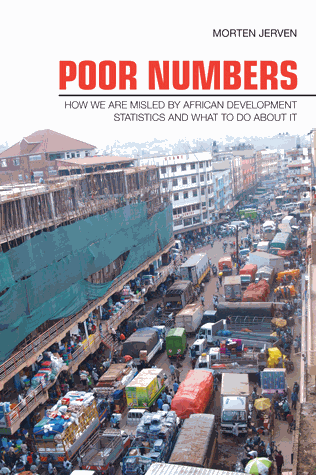Poor Numbers: how we are misled by African development statistics and what to do about it – By Morten Jerven

 On November 5, 2010, Ghana Statistical Services announced that it was revising its GDP estimates upwards by over 60 percent, suggesting that that in the previous GDP estimates about US$13 billion worth’s of economic activity had been missed. As a result, Ghana was suddenly upgraded from a low to lower-middle-income country. In response to this change, Todd Moss, the development scholar and blogger at the Center of Global Development in Washington DC exclaimed: “˜Boy, we really don’t know anything!‘
On November 5, 2010, Ghana Statistical Services announced that it was revising its GDP estimates upwards by over 60 percent, suggesting that that in the previous GDP estimates about US$13 billion worth’s of economic activity had been missed. As a result, Ghana was suddenly upgraded from a low to lower-middle-income country. In response to this change, Todd Moss, the development scholar and blogger at the Center of Global Development in Washington DC exclaimed: “˜Boy, we really don’t know anything!‘
Shanta Devarajan – The World Bank’s Chief Economist for Africa – struck a more dramatic tone. In an address to a conference organized by Statistics South Africa, he called the current state of affairs “˜Africa’s statistical tragedy‘.
How good are these numbers?
My book – Poor Numbers: how we are misled by African development statistics and what to do about it – presents a study of the production and use of African economic development statistics. All of the central questions in development revolve around the measure of the production and consumption of goods and services. This is expressed in an aggregate composite metric called the Gross Domestic Product (GDP) which is used to rank and rate the wealth and progress of nations. It is the most widely used measure of economic activity, yet little is known about how this metric is produced and misused in debates about African economic development.
For a number of years now I have been trying to answer the question: How good are these numbers? The short answer is that the numbers are poor. This is just not a matter of technical accuracy – the arbitrariness of the quantification process produces observations with very large errors and levels of uncertainty. This “˜numbers game’ has taken on a dangerously misleading air of accuracy, and the resulting figures are used to make critical decisions that allocate scarce resources. International development actors are making judgments based on erroneous statistics. Governments are not able to make informed decisions because existing data are too weak or the data they need do not exist.
What happened in Ghana?
How could the country be among the poorest in the world one day, and find itself amongst aspiring middle income countries the next?
To grasp this chain of events, a basic understanding of national accounting is necessary. GDP is typically calculated as a sum of the “˜value added’ of the production of goods and services in all sectors of the economy. In order to compare one year’s value added with another, and thus get an idea of whether the economy is expanding or contracting, a new set of sums for all the sectors are computed. In order for these two amounts to be comparable, they are expressed in constant prices. The easiest way of doing this, particularly if data are sparse, which they are at most African statistical offices, is to generate “˜base year’ estimate for future level estimates.
When picking a “˜base year’ the statistical office chooses a year when it has more information on the economy than normally available; such as data from a household, agricultural or industrial survey. The information from these survey instruments is added to the normally available administrative data to form a new GDP estimate. This new total is then weighted by sectors, thereafter other indicators and proxies are used to calculate new annual estimates.
The importance of “˜base year’
The “˜base year’ is very important in three respects. Firstly, the GDP estimates will be expressed in constant prices for the base year. Second, the index number applies, so that a sector that was very economically important in the base year will continue to appear very important despite structural changes that may have occurred since the last base year.
Conversely, sectors that were unimportant or not even existing will barely have an impact on the official GDP statistics. Finally, the data sources and the use of proxies are set in the base year. Even when new information is becoming available, national accountants may be unwilling or unable to add this data to the GDP series. Thus, when the base year is out of date, the GDP series is becoming an increasingly reliable guide to interpreting real economic change. The IMF statistical division recommends a change of base year every fifth year.
In the case of Ghana, their previous base year was made in 1993. Quite obviously, the structure of the economy has changed radically since then, partly due to the introduction of new technologies, such as the mobile phone and partly due to economic policy, such as the continued liberalisation and importance of non-state delivery of services such as in tertiary education. Through some sample surveys and availability of administrative data, such as those derived from Value Added Taxation, the statistical office was increasingly aware that their estimates were underestimating the size of the Ghanaian economy. Ghana Statistical Services therefore requested the services of the IMF as early as in 2002, which contracted a consultant to undertake the rebasing and revision of GDP estimates in the country.
What about the comparisons with other countries? How should we compare the income and growth of Ghana with Nigeria, Kenya or other economies in the region? The lack of comparability of data and methods in national accounting practices in Sub-Saharan Africa is disturbing. According to my own survey, only ten of these countries have a base year that is less than a decade old, when I compared the statistics available from the World Bank and those published by the national statistical agencies that actually compile the GDP statistics, there was an alarming level of discrepancy. A comparison of the data published in other sources further added support to the conclusion that with the current uneven application of methods and poor availability of data, any ranking of countries according to GDP levels is misleading.
Nigerian revision pending
Meanwhile, in Nigeria an upward revision is pending. Their base year for the national accounts, 1990, is even more outdated than that of Ghana. According to reports from the National Bureau of Statistics (NBS), Nigeria plans to change the base year for its gross domestic product (GDP) to 2008. It has been boldly announced that this could lead to a “huge jump” in GDP figures.
This radically challenges our current understanding of economic development in Nigeria and in Africa. According to the World Development Indicators’ most recent data, the total GDP in current $US in 2010 was above 200 billion. Nigerian GDP, before the predicted revision, already accounts for 18 percent of Sub-Saharan Africa’s total (about 1,200 billion $US). The reports in the media, from the IMF and the NBS all indicate that Nigerian GDP will increase at least as much as in the recent case in Ghana.
Let us be conservative and assume that the GDP in Nigeria merely doubles following the revision. It will alone mean that the GDP for the whole region increased more than 15 percent. The value of the increase accrues to nothing less than 40 economies roughly the size of Malawi’s. The knowledge that currently there are 40 “˜Malawis’ unaccounted for in the Nigerian economy should raise a few eyebrows.
It is a real tragedy that the statistical capacities of Sub-Saharan African economies are in such a poor state. African development statistics tell us less than we would like to think about income, poverty and growth in Sub-Saharan Africa. One of the most urgent challenges in African economic development is to devise a strategy for improving statistical capacity. This system currently causes more confusion than enlightenment. However, governments, international organizations and independent analysts do need these development statistics to track and monitor efforts at improving living conditions on the African continent.
Poor numbers are too important to be dismissed as just that.
Morten Jerven is Assistant Professor at the Simon Fraser University, School for International Studies. His book Poor Numbers: how we are misled by African development statistics and what to do about it is published by Cornell University Press.






[…] of our journal, African Affairs, Professor Morten Jerven of Simon Fraser University Vancouver, drew attention tothe 2010 revision of Ghana’s GDP figures upwards by over 60 percent. Overnight Ghana was $13 […]
[…] of our journal, African Affairs, Professor Morten Jerven of Simon Fraser University Vancouver, drew attention to the 2010 revision of Ghana’s GDP figures upwards by over 60 percent. Overnight Ghana was $13 […]
[…] of our journal, African Affairs, Professor Morten Jerven of Simon Fraser University Vancouver, drew attention to the 2010 revision of Ghana’s GDP figures upwards by over 60 percent. Overnight Ghana was $13 […]
[…] of our journal, African Affairs, Professor Morten Jerven of Simon Fraser University Vancouver, drew attention to the 2010 revision of Ghana’s GDP figures upwards by over 60 percent. Overnight Ghana was $13 […]
[…] of our journal, African Affairs, Professor Morten Jerven of Simon Fraser University Vancouver, drew attention to the 2010 revision of Ghana’s GDP figures upwards by over 60 percent. Overnight Ghana was $13 […]
[…] pour estimer le PIB et son évolution, les statisticiens s'appuient sur une année de base, durant laquelle ils ont disposé de meilleures données (par exemple, parce qu'une étude plus […]
[…] of our journal, African Affairs, Professor Morten Jerven of Simon Fraser University Vancouver, drew attention to the 2010 revision of Ghana’s GDP figures upwards by over 60 percent. Overnight Ghana was $13 […]
[…] to do about it†by Morten Jerven from Simon Fraser University in Canada was published (see this African Arguments piece for a summary). It makes the case that African statistics are often worse than useless, and […]
[…] have caused confusion and disbelief in the development community. As I have explained in African Arguments, the cause for these large upward revisions is that the base year, the foundation of the system […]
[…] may be. Similarly, if the process by which that measure of X is generated keeps changing—say, national statistical agencies make idiosyncratic revisions to their accounting procedures, or coders keep changing its coding rules—then a model based on the earlier versions will […]
As a Zimbabwean who has been in the country since 1983 after Independence and an economist trained at LSE (1979-82) I find the issue of poor numbers and lying with statistics very relevant to our economy! Our economy has gone too informal to the extent of confusing many scholars who would think they know what a collapsed economy should be . There have been debates about the unemployment figures , using the traditional definition of statistics! I think Zim economy is a fertile area for future studies to test the formal GDP figures in respect of a highly informal and surviving economic system that defies economic logic!